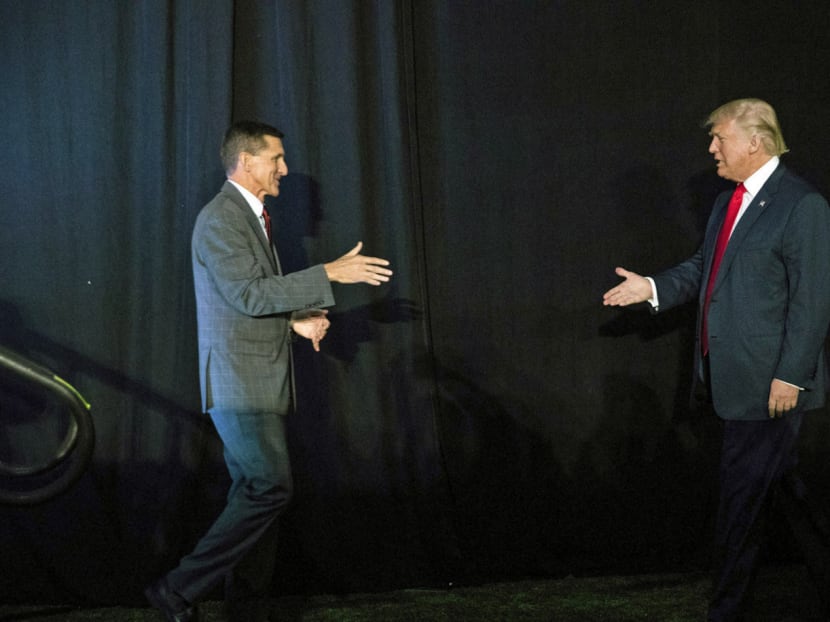US Cabinet takes shape as controversial picks accept top posts
WASHINGTON — The contours of the Trump administration began taking shape yesterday after the acceptance of top posts in the intelligence and justice branches of the government by three officials who have had brushes with controversy in the past.

Retired Lieutenant-General Michael Flynn (left), who is said to have accepted the post of national security adviser, believes Islam is a political ideology, not a religion, and has even called it a cancer. Photo: The New York Times
WASHINGTON — The contours of the Trump administration began taking shape yesterday after the acceptance of top posts in the intelligence and justice branches of the government by three officials who have had brushes with controversy in the past.
President-elect Donald Trump picked Lieutenant-General Mike Flynn as national security adviser, Senator Jeff Sessions for Attorney-General and Representative Mike Pompeo as Central Intelligence Agency director. According to a transition officer, all three have accepted the offer.
Mr Flynn, 57, a registered Democrat, was Mr Trump’s main national security adviser during his campaign. He will be a critical gatekeeper for a president with little experience in military or foreign policy issues.
Mr Trump and Mr Flynn both see themselves as brash outsiders who hustled their way to the big time. They both post on Twitter often about their own successes, and they have both at times crossed the line into outright Islamophobia.
They also both sometimes exhibit a loose relationship with facts: Mr Flynn, for instance, has claimed that Syariah, or Islamic law, is spreading in the US.
His dubious assertions are so common that when he ran the Defence Intelligence Agency (DIA), subordinates came up with a name for the phenomenon: They called them “Flynn facts”.
As an adviser, Mr Flynn has proved to be a powerful influence on Mr Trump, convincing the President-elect that the US is in a “world war” with Islamist militants and must work with any willing allies in the fight, including President Vladimir Putin of Russia.
In numerous speeches and interviews before the election, and in a book published in August, Mr Flynn laid out a view of the world that sees the US as facing a singular, overarching threat that can be described in only one way: Radical Islamic terrorism.
Radical Islam poses an existential threat on a global scale, and Islam itself is the source of the problem, he said, describing it as a political ideology, not a religion. He has even gone so far as to call it a cancer.
In Mr Trump, Mr Flynn found someone who was more than willing to listen. He readily signed on to the campaign and quickly emerged as the angry voice of the national security establishment, leading chants of “lock her up” against Mrs Hillary Clinton at rallies. And now, after months of the two men talking to each other, it can be hard to tell where Mr Trump’s views end and Mr Flynn’s begin.
In choosing Mr Sessions, 69, as the nation’s chief law-enforcement officer, Mr Trump would award a loyalist whose hard-line and at times inflammatory statements on immigration were similar to his own.
Mr Sessions opposes any path to citizenship for undocumented immigrants and was an enthusiastic backer of Mr Trump’s promise to build a wall on the border with Mexico.
While Mr Sessions is well-liked in the Senate, his record as a US prosecutor in Alabama in the 1980s is very likely to become an issue for Democrats and civil rights groups expected to subject it to close scrutiny.
While serving as a US prosecutor in Alabama, Mr Sessions was nominated in 1986 by then-president Ronald Reagan for a federal judgeship. But his nomination was rejected by the Republican-controlled Senate Judiciary Committee because of racially charged comments and actions. At that time, he was one of two judicial nominees whose selections were halted by the panel in nearly 50 years.
In testimonies before the committee, former colleagues said Mr Sessions had referred to the National Association for the Advancement of Coloured People, the Southern Christian Leadership Conference and other civil rights groups as “un-American” and “communist-inspired”.
An African-American federal prosecutor then, Mr Thomas Figures said Mr Sessions had referred to him as “boy” and testified that Mr Sessions said the Ku Klux Klan was fine “until I found out they smoked pot”. Mr Sessions had dismissed that remark as a joke.
Mr Pompeo, 52, is not without his own controversies. As a congressional candidate in 2010, he had to personally apologise for a tweet his campaign sent out promoting an article that called his opponent Raj Goyle an Indian-American Democrat, a “turban topper” who “could be a Muslim, a Hindy, a Buddhist etc who knows”.
His campaign also put up billboard ads encouraging people in the area to “vote American”.
Mr Pompeo is a lifetime member of the National Rifle Association, which endorsed him for Congress. He is also a hardliner on abortion, keen to ban it in all instances except where the mother’s life is at risk.
He had initially supported Florida Senator Marco Rubio’s presidential bid but turned to Mr Trump when it was clear that he would clinch the Republican nominee. He is said to be close to Vice-President-elect Mike Pence. AGENCIES






